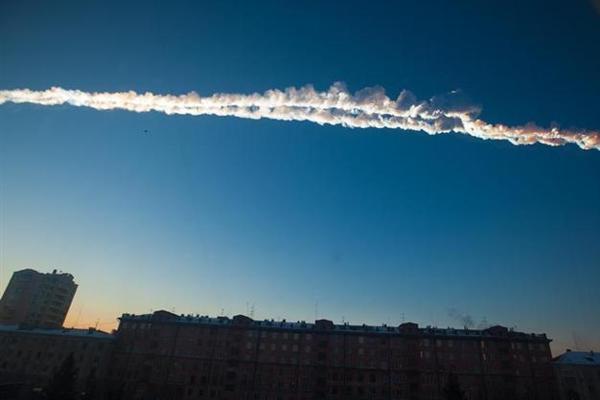Video depicts Russian meteor strike that injured almost 950
MOSCOW - Agence France-Presse


In this photo provided by Chelyabinsk.ru a meteorite contrail is seen over Chelyabinsk on Friday, Feb. 15, 2013. AP Photo/Chelyabinsk.ru
Around 950 people were injured today when a meteor burned up above the central Russian city of Chelyabinsk, unleashing a shockwave that shattered panes of glass, the regional governor said.Chelyabinsk Regional Gov. Mikhail Yurevich, quoted by the RIA Novosti news agency, said two-thirds of the injuries were light wounds from pieces of glass and other materials. In the city of Chelyabinsk alone, 758 people had required medical help, the city said in a statement on its website.
The following video, uploaded to Russia Today's official Youtube account, shows exploding meteors in the country.
The plunging meteor exploded with a blinding flash, sowing panic as the hurtling space debris set off a shockwave that smashed windows.
The extraordinary event brought morning traffic to a sudden halt in Chelyabinsk as shocked drivers stopped to watch the falling meteor partially burning up in the lower atmosphere and light up the sky.
Mobile communications were temporarily cut. It was not clear if the meteor's entry into the atmosphere was linked to the asteroid 2012 DA 14, which is expected to pass about 27,000 kilometers above the Earth later today in an unusually close approach.
"At 0920 (0320 GMT) an object was observed above Chelyabinsk which flew by at great speed and left a trail behind. Within two minutes there were two bangs," regional emergencies official Yuri Burenko said in a statement. "The shockwave broke glass in Chelyabinsk and a number of other towns in the region."
The office of the local governor said in a statement that a meteorite had fallen into a lake outside the town of Chebakul in the Chelyabinsk region. This was not confirmed by federal officials, who insisted any fragments were yet to be found.
There were no reports that any locals had been hurt directly by a falling piece of meteorite. The Defence Ministry, meanwhile, said it had sent soldiers "to the sites of impact," without giving further details. Schools were closed for the day and theater shows canceled across the region after the shock wave blew out windows amid temperatures as low as minus 18 degrees Celsius. The local postal service said several of its buildings had been damaged while the stadium of Chelyabinsk's Traktor hockey side was also hit, forcing the cancelation of a match. State television showed a part of the roof and a wall also shorn off a brick zinc factory in the city of Chelyabinsk. Other images showed people with bloodied faces and at least one child's back covered with blood.
'A large object weighing tons'
The meteor "was quite a large object with a mass of several dozen tons," said Russian astronomer Sergei Smirnov of the Pulkovo observatory in an interview with the Rossia 24 channel.
NASA estimates that a smallish asteroid such as the 2012 DA 14 flies close to Earth every 40 years but only hits our planet once every 1,200 years. But the Chelyabinsk meteor explosion appears to be one of the most stunning consmic events above Russia since the 1908 Tunguska Event when a massive blast most scientists blame on an asteroid or a comet impact ripped through Siberia. With the event already becoming a leading trend on Twitter, locals posted amateur footage on YouTube showing men swearing in surprise and fright, and others grinding their cars to a halt. "First I thought it was a plane falling, but there was no sound from the engine... after a moment a powerful explosion went off," said witness Denis Laskov. "In a lot of the houses on our street the windows were blown out," he told state television.
The Chelyabinsk region is Russia's industrial heartland, filled with smoke-chugging factories and other huge facilities that include a nuclear power plant and the massive Mayak atomic waste storage and treatment centre. A spokesman for Rosatom, the Russian nuclear energy state corporation, said its operations remained unaffected. "All Rosatom enterprises located in the Urals region -- including the Mayak complex -- are working as normal," an Rosatom spokesman told Interfax.
The Emergencies Ministry said radiation levels in the region also did not change and that 20,000 rescue workers had been dispatched to help the injured and locate those requiring help.

